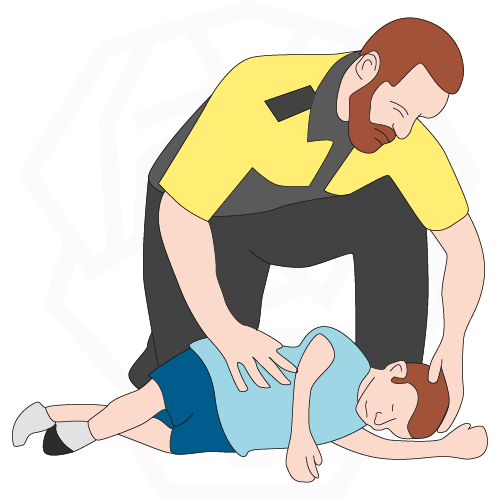First aid - Adapted to early childhood (8h)
This training is specifically designed for early childhood educators. It equips them with essential skills to respond to medical emergencies involving young children, particularly infants and preschoolers.
The program covers severe allergy management, CPR, airway obstruction and injury management, as well as emergency action plans.
Offered online, in hybrid format, or in person, this training meets the requirements of the Ministry of Family. It ensures the safety of children and peace of mind for parents.
- Learn at your own pace, wherever you are
- Available 24/7
- Immediate certification at the end of the training
- Combine online learning and in-person assessment
- Schedule the training according to your team's needs
- Dedicated trainer for specific solutions
- Live learning with a dedicated trainer
- Interactive and hands-on sessions at your premises
- Tailored to the specific needs of your group
* Please note that an additional travel fee of $90.00 per training day applies to hybrid and in person trainings.
* Hybrid and in person trainings requires a minimum of 10 students.
Summary:
- 100% online training
- Eight (8) hours of training
- Includes management of severe allergies
- Meets the requirements of the "Ministère de la famille
- Certification valid for three (3) years
Learning tools:
- Complete medical lexicon
- Instant assistant
- Mobile application
- Interactive videos
- Detailed explanations
- Maintenance of skills
- Automated update system
- Continuous training via our social networks
- *Telephone/video conferencing assistance
*We respond to personalized support requests from our members.
Manage your organization with our free "Manager" profile:
- Status of ongoing training
- Access to all your members' certificates
- Automatic renewals
- Simple and efficient management

Training details
- Length of training: 8 hours.
- Certification valid for a period of 3 years.
- Specific training for first aid adapted to early childhood.
- Includes a component on allergic reactions of the anaphylactic type.
Success criretia
- Complete all the readings included in the Early Childhood First Aid training.
- Complete all mandatory practical sessions within the given minimum time requirements.
- Pass with an average of 80% or more each of the theoretical evaluations included in the training.
Certification
- Upon successful completion of your Early Childhood First Aid training through practical sessions at home as well as multiple choice theory exams, you will receive your certificate in "PDF" format, valid for a period of 3 years.
Intervention protocols
- Click HERE to access the intervention protocols for this training.

First Aid Training for Early Childhood Educators: Becoming an Early Childhood First Responder
The importance of early childhood first aid training for educators
Early childhood educators play a critical role in the safety and well-being of the children in their care. In the event of a medical emergency, it is important that educators know how to respond effectively to ensure the safety and comfort of children. Early childhood first aid training is therefore essential for early childhood educators. It provides them with the skills and knowledge to recognize and quickly deal with emergencies that may arise in the course of their work. It also teaches them how to take preventive measures to avoid injuries and accidents to children, and how to implement action plans in case of emergency situations. In short, early childhood first aid training is an important investment in ensuring the safety and well-being of children, as well as providing peace of mind to parents and families.

The Ministry of the Family's requirements for first aid training for child care workers
In Quebec, the Ministry of the Family has strict requirements to ensure the safety and well-being of children in child care settings. All people working with young children, including child care workers, must take a general first aid course adapted to young children, lasting a minimum of 8 hours and including a component on severe allergic reactions of the anaphylactic type. This certification is valid for a maximum of 3 years and must be renewed regularly. It is the responsibility of the early childhood educators to ensure that their certification is up to date and complies with the standards of the Ministry of the Family. These requirements apply to all types of child care settings, including child care centres, family child care homes, early childhood centers and summer camps. By meeting these standards, child care providers can ensure the safety of the children in their care and meet the expectations of parents and families for the safety and well-being of children.
Académie Saint-Bernard is proud to offer first aid training adapted to early childhood that meets the requirements of the Ministère de la Famille. In fact, our online training allows childcare workers to become familiar with the skills and knowledge necessary to effectively respond to emergency situations involving children. The various theories taught in our program are validated by theory exams, allowing learners to verify their understanding and validate their knowledge. In addition, our training includes practical sessions where learners will be able to practice the first aid techniques learned online. Our proprietary automated system verifies that learners have completed all of their practical sessions. By choosing our Early Childhood First Aid training, childcare providers can be assured that our program meets the requirements of the Ministry of the Family, while offering the flexibility and convenience of online training.

First Aid Training for Early Childhood Educators: Specific Skills to Meet the Needs of Children
The Early Childhood First Aid Training for Educators is designed to meet the specific needs of young children. The training includes specific skills that enable early childhood educators to recognize and quickly deal with emergencies that may occur with children. It also teaches them preventive measures to avoid injuries and accidents to children. Specific skills taught in first aid training include recognition and treatment of severe anaphylactic allergic reactions, management of obstructed airways, cardiopulmonary resuscitation, management of injuries and bleeding, recognition of signs of distress in infants and young children, and management of seizures and convulsions. In addition, ECEs learn how to implement emergency action plans and communicate effectively with emergency services and children's parents. In short, Early Childhood First Aid training is designed to provide child care workers with the skills and knowledge necessary to ensure the safety and well-being of the children in their care.

Benefits of 100% online early childhood first aid training for child care providers and children
There are several benefits to online early childhood first aid training for child care providers and children. First, it offers flexibility in terms of learning time and location, allowing child care providers to complete the training at their own pace and on their own schedule. In addition, the online training modules are designed to be interactive and engaging, with instructional videos, interactive quizzes, and emergency simulations. This allows childcare providers to learn in a more effective and engaging way.
In addition, online first aid training tailored to early childhood allows early childhood educators to strengthen their skills in child safety and injury prevention. Early childhood educators can also keep up to date on the latest first aid practices and recommendations for children, which can help them better meet their children's needs and avoid emergency situations.
For children and parents, the benefits of early childhood online first aid training for child care providers are also significant. Trained early childhood educators can quickly and effectively recognize emergency situations and treat them appropriately, which can reduce the risk of injury and complications for children. In addition, children and parents can feel safer and more confident knowing that their child care provider is well-trained in first aid. In short, early childhood online first aid training is a valuable investment for both child care providers and children, as it helps to enhance the safety and well-being of children in child care and preschool settings.

The different aspects of first aid training for childcare workers: theory, practice and scenarios
The First Aid for Child Care Educators course offered by the Académie Saint-Bernard is entirely online and has several important aspects. First, the training is available over a ten-week period, allowing you to work at your own pace and log in and out as often as needed. The theory training includes several multiple-choice exams that will help you validate your understanding of each block of reading and you will need to achieve a minimum score of 80% on each assessment. If you fail, you can retake the exam immediately to obtain the required grade. Next, you will be required to complete the entire practical sessions that will allow you to practice first aid maneuvers using a mannequin that you will make at home. St. Bernard Academy's exclusive automated system will guide your practice steps and monitor your progress to deliver your certification. You will also be invited to download our FREE CPR - ASB mobile app to use as an accessory to ensure a proper rhythm of compressions and breaths. Finally, all training is delivered online, eliminating the need for travel or a visit to your home by an academy representative.

First aid training for child care professionals: How to apply them in everyday life
First aid training for early childhood educators teaches many skills that are essential to meeting the needs of children in emergency situations. These skills include the ability to assess an emergency situation, implement necessary safety measures and administer first aid. Educators also learn how to manage stressful situations, communicate effectively with children and parents, and work as a team. These skills can be put into practice on a daily basis by ensuring the safety of children in their activities and responding quickly and effectively to emergencies. By being trained in first aid, educators can feel confident that they can respond quickly and effectively in the event of an emergency, which helps to reassure children and parents.

How to choose the right early childhood first aid training for your needs and requirements.
When it comes to choosing first aid training for early childhood educators, it's important to consider several factors. First, ensure that the training is specifically designed to meet the needs of young children. Online training can offer significant advantages, including flexibility and convenience. This is because educators can access the training at their own pace and according to their busy schedules. It is also important to ensure that online training is accredited and recognized by the appropriate organizations. St. Bernard Academy, offers online first aid training recognized by relevant first aid and first aid organizations. Furthermore, it is important to verify that the online training includes both theoretical and practical aspects, as well as situational scenarios. Finally, it is important to consider the costs and benefits of online training versus in-person training, as well as feedback from other early childhood educators who have taken the online training.

Stand out in the job market